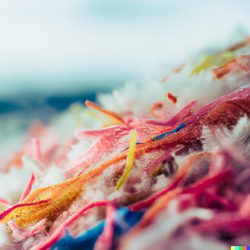Fate and Impact of (Micro- and Nano-) Plastics on Health

Micro- and nano-plastics (MNP) are pieces of plastic of a size between 5 millimeters and 1 nanometer that have infiltrated everything on earth, including the top of mount Everest and the air we breathe. Microplastic problem is getting more and more attention: from alarming news articles to Doctor Who episodes. But what are the effects on our health? How can we solve the problem?
Complex global challenges such as microplastics need an interdisciplinary approach. By joining this summer school you will have a 360 education on the topic of microplastic. You will learn about causes and solutions from the perspective of different disciplines, including epidemiology, toxicology, social sciences and political sciences.
The following topics will be discussed:
-
What are the definitions, characteristics and causes of MNP pollution?
-
How does MNP enter our body?
-
What are the effects of microplastic on human health?
-
What could be potential solutions?
-
How to effectively raise awareness on microplastics and stimulate behavior change?
-
How to design policies to reduce MNP pollution?
We will offer a program balancing theory, practice and fun: you will attend a week of lectures, workshops, hands-on activities and social events.
By joining this summer school, you will learn about a topic of high societal importance, discover how to work together with people from different backgrounds, network with young students interested in global challenges like you.
Practical information
|
Dates
|
30 June - 2 July 2026 |
|
Location
|
Groningen, the Netherlands |
|
Level
|
For PhD students, Post-docs and Research Master students |
|
Fees |
€ 450 - Standard fee for PhD students
PhD students from Universities part of the ENLIGHT Plastimpact Network: please contact your coordinator to know how to receive a grant |
|
Academic coordinators
|
Irene Maltagliati, Barbro Melgert, Josefine Geiger |
|
Contact
|
microplastics.summerschool@rug.nl |
Requirements
Who is this summer school for?
This summer school is designed for PhD students, Post-docs and Research Master students working on the topic of (micro/nano-)plastics.
It is expected that the participants have a sufficient command of the English language to actively participate in the discussions and to present their own work in English.
Course schedule
Preliminary schedule
Lectures with discussions
-
Introduction on Microplastics and Health
-
Exposure Route and Emission Sources
-
Breathing MNPs
-
Ingesting MNPs
-
Toxicology
-
Policies on Public Health
-
Health Psychology and Communication
Group works
-
Brainstorming session: Define the problem
-
Working in Group
-
Present your research
-
Brainstorming session: Design a solution plan
Parallel workshop:
-
Field trip in the lab
-
Eco-anxiety and Mindfulness
-
Develop your citizen science initiative
-
Write your interdisciplinary grant
Social events
-
Welcome Drinks
-
Scavenger hunts
-
Dinner
Learning outcomes
Learning outcomes
After this course you will be able to:
-
Describe the characteristics of micro- and nano-plastic and identify the causes of the problem in terms of emission sources and exposure routes
-
Describe the effects of microplastics to human health
-
Identify relevant political decision-making processes, product characteristics and psychological factors related to microplastics problem and solutions
-
Critically reflect on a complex topic form the perspective of different disciplines
-
Develop skills for interacting and collaborating with students and experts from different backgrounds
-
Apply interdisciplinary knowledge to plan and/or assess (preventative or remedial) policies, strategies and interventions
Workload
Preparation: 7 hours
Lectures: 10 hours
Discussions and workshops: 11 hours
Upon successful completion of the programme, the Summer School offers a Certificate of Attendance that mentions the workload of 28 hours (28 hours corresponds to 1 ECTS). Students can apply for recognition of these credits to the relevant authorities in their home institutions, therefore the final decision on awarding credits is at the discretion of their home institutions. We will be happy to provide any necessary information that might be requested in addition to the certificate of attendance
Applications
How to apply?
To apply, kindly fill out the online application form and include the following:
-
Curriculum Vitae (max. 2 pages)
-
Motivation letter, clearly stating why you want to join this summer school, what you will bring to the school and what you hope to learn (max. 1 page)
The application deadline is 1 March 2026. Applications will be reviewed after the deadline has passed and the applicants will be informed of the outcome of the selection process by 15 March 2026.

